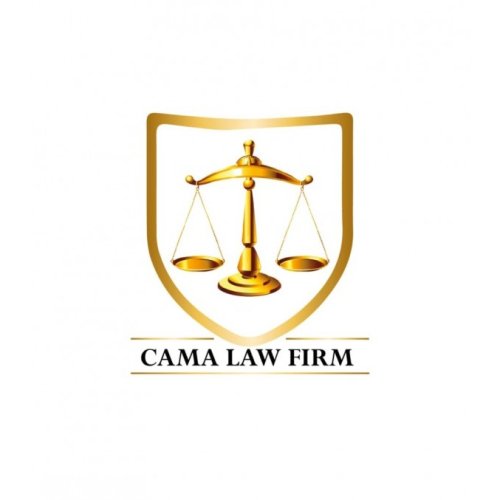Best Faith-Based Law Lawyers in Cameroon
Share your needs with us, get contacted by law firms.
Free. Takes 2 min.
Or refine your search by selecting a city:
List of the best lawyers in Cameroon
About Faith-Based Law in Cameroon
Faith-Based Law in Cameroon refers to the legal practices and frameworks that are influenced by religious beliefs and doctrines within the country. Cameroon is a nation with diverse religious communities, including Christianity, Islam, and traditional indigenous beliefs. The legal system recognizes the importance of these religious practices, and faith-based law often intersects with civil law, particularly in matters such as marriage, divorce, inheritance, and family-related disputes. The integration of religious norms into the legal structure aims to respect cultural and spiritual values while ensuring justice and equality under the law.
Why You May Need a Lawyer
There are several situations where individuals might require legal assistance in the domain of Faith-Based Law in Cameroon:
- Marriage and Divorce: Navigating the legal requirements and implications of religious marriages and divorces can be complex, and legal aid may be needed to ensure compliance with both religious and civil regulations.
- Inheritance: Faith-Based Law often influences the distribution of inheritance, with different religions having specific rules. Legal expertise can help ensure the correct application of these principles.
- Child Custody: Disputes related to child custody can involve religious considerations, requiring specialized legal counsel.
- Property Disputes: Issues arising from property ownership and transfer may be influenced by religious laws, necessitating professional legal guidance.
- Employment Contracts: Religious principles might impact certain employment contracts, especially in faith-based organizations, where legal advice could be required.
Local Laws Overview
Faith-Based Law in Cameroon operates within the broader context of the country's legal system, which combines French civil law, English common law, and customary law. Some key aspects of local laws relevant to Faith-Based Law include:
- Family Law: This includes marriage, divorce, and child custody laws, which often integrate elements from religious doctrines aligned with the individual's faith.
- Inheritance Law: Inheritance rights may be governed by religious laws, especially in communities with strong traditional beliefs.
- Customary Law: Aspects of customary law, which may be influenced by religious norms, are recognized and can affect various civil matters.
- Freedom of Religion: The constitution provides for the freedom of religion, which influences legal decisions respecting religious practices.
Frequently Asked Questions
Can religious marriages be legally recognized in Cameroon?
Yes, religious marriages can be legally recognized if they meet the necessary civil requirements set by the state, including registration with the government.
What role does customary law play in Faith-Based Law?
Customary law, often rooted in religious traditions, is recognized in the Cameroonian legal system and can influence civil matters such as marriage, inheritance, and family disputes.
Are there specific legal provisions for Islamic law in Cameroon?
Yes, Islamic law is particularly influential in northern regions of Cameroon and can affect issues like marriage, divorce, and inheritance for Muslims.
How does Faith-Based Law impact divorce proceedings?
Faith-Based Law can significantly affect divorce proceedings, especially regarding the division of property and child custody, as religious principles are considered alongside civil laws.
Can a lawyer help with inheritance disputes involving religious law?
Absolutely, a lawyer with expertise in Faith-Based Law can provide invaluable assistance in navigating inheritance disputes where religious laws come into play.
What is the process for legally adopting a child in Cameroon with regard to Faith-Based Law?
Adoption processes must comply with both civil regulations and, if applicable, religious guidelines, necessitating legal assistance to ensure all criteria are met.
Do religious organizations require legal advice for their operations in Cameroon?
Yes, religious organizations may need legal advice to comply with national laws regarding registration, property ownership, and employment practices, especially those that intersect with their faith-based operations.
Are there legal protections for individuals practicing minority religions?
The Cameroonian constitution provides for freedom of religion, offering legal protection for individuals of minority faiths against discrimination.
How is marriage annulment treated under Faith-Based Law?
Annulment may be pursued under specific conditions where religious and civil laws intersect, requiring legal consultation to navigate both domains effectively.
Can Faith-Based Law impact business contracts in Cameroon?
Yes, particularly in businesses tied to religious institutions, contracts may be influenced by religious principles, thus necessitating legal advice to ensure compliance with all relevant laws.
Additional Resources
For those seeking further assistance and resources regarding Faith-Based Law in Cameroon, the following can be particularly helpful:
- Cameroon Bar Association: This is a professional body of lawyers who are well-versed in different areas of law, including faith-based legal matters.
- Local Religious Councils: These councils can provide guidance and resources, especially concerning issues that overlap between sacred doctrines and national law.
- Ministry of Justice: Offers comprehensive information on legal rights and responsibilities in Cameroon, including those related to religious practices.
- Legal Aid Clinics: Many universities and NGOs run clinics that provide free or low-cost legal advice, a valuable resource for individuals unable to afford private counsel.
Next Steps
If you find yourself in need of legal assistance regarding Faith-Based Law in Cameroon, consider the following steps:
- Consult a Specialist: Seek a lawyer specializing in Faith-Based Law to guide you through the legal intricacies relating to your case.
- Gather Relevant Documents: Collect any documents pertinent to your case, such as marriage certificates, wills, or religious decrees, to provide a comprehensive overview for your lawyer.
- Understand Your Rights: Familiarize yourself with both your legal and religious rights to better discuss your needs and options with a legal professional.
- Schedule a Legal Consultation: Arrange an appointment with a legal advisory service to evaluate your situation and explore potential legal strategies.
- Explore Out-of-Court Options: Consider mediation or arbitration, particularly in family-related disputes, as these alternatives may offer amicable resolutions while respecting religious considerations.
Lawzana helps you find the best lawyers and law firms in Cameroon through a curated and pre-screened list of qualified legal professionals. Our platform offers rankings and detailed profiles of attorneys and law firms, allowing you to compare based on practice areas, including Faith-Based Law, experience, and client feedback.
Each profile includes a description of the firm's areas of practice, client reviews, team members and partners, year of establishment, spoken languages, office locations, contact information, social media presence, and any published articles or resources. Most firms on our platform speak English and are experienced in both local and international legal matters.
Get a quote from top-rated law firms in Cameroon — quickly, securely, and without unnecessary hassle.
Disclaimer:
The information provided on this page is for general informational purposes only and does not constitute legal advice. While we strive to ensure the accuracy and relevance of the content, legal information may change over time, and interpretations of the law can vary. You should always consult with a qualified legal professional for advice specific to your situation.
We disclaim all liability for actions taken or not taken based on the content of this page. If you believe any information is incorrect or outdated, please contact us, and we will review and update it where appropriate.
Browse faith-based law law firms by city in Cameroon
Refine your search by selecting a city.










